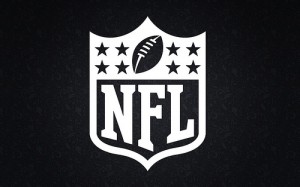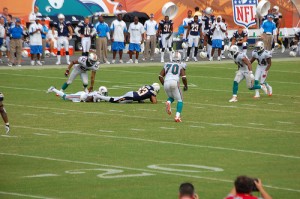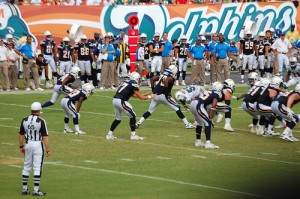 The ingredients are simple: Take one talented young athlete. Add one agent, one team owner, dozens of family members not heard from in decades, a few dashes of self-entitlement, several bushels of undisciplined spending habits, one unscrupulous financial advisor, a couple of shakes of bad business investments, and a handful of injuries. Yield: One post-NFL broke athlete.
The ingredients are simple: Take one talented young athlete. Add one agent, one team owner, dozens of family members not heard from in decades, a few dashes of self-entitlement, several bushels of undisciplined spending habits, one unscrupulous financial advisor, a couple of shakes of bad business investments, and a handful of injuries. Yield: One post-NFL broke athlete.
Travis Henry, Mushin Muhammed and Deuce McCallister are just three examples of ex-athletes intoxicated and hung-over by the dollars. In spite of the millions they made in the NFL, all three (and many more) have traveled to the intersection of broke and busted. In fact, Sports Illustrated reports that 78% of post-NFL athletes are broke within two to five years after leaving the NFL.
Does the outcome lay solely on the athletes broad shoulders or should many take part in the blame game where nobody wins, especially not the athlete?
David Mitchel of Norton-Michel Marketing provided his insight about broke ballers who have turned fame and fortune into a flop. David says it really originates with the NCAA. “The NCAA system has deviated significantly from what it was when it was founded. The modern college athletic system doesn’t understand the meaning of student-athlete…the goal of the NCAA should be to make sure that the players participating in NCAA sports are equipped to handle a career in something other than sports.”
 The topic of post-NFL broke athletes ignites a high degree of emotional fire for both those in the industry and outsiders alike. It exposes the underbelly of the NFL and brings to light the dedicated athletes from past decades who played for nearly nothing and are today homeless and broke with no insurance to fund their on-going medical needs. Voices of the NFLPA like Nolan Harrison are working aggressively to gain benefits yardage for retired athletes of yesteryear.
The topic of post-NFL broke athletes ignites a high degree of emotional fire for both those in the industry and outsiders alike. It exposes the underbelly of the NFL and brings to light the dedicated athletes from past decades who played for nearly nothing and are today homeless and broke with no insurance to fund their on-going medical needs. Voices of the NFLPA like Nolan Harrison are working aggressively to gain benefits yardage for retired athletes of yesteryear.
The majority of responses in a recent poll I conducted revealed that it’s really not the responsibility of the NFL to ensure young athletes are fiscally sound. The respondents replied that even though a portion of the disconnect may actually lie in the hands of many, it’s ultimately up to the athlete himself and the decisions he makes.
Mike Minter, former all-pro safety for the Carolina Panthers experienced the highs and lows of NFL life and was privileged to stay with one team his entire 10-year career. When asked, Mike told me, “I believe it has to do with many factors but the most devastating one is when you are playing, you acquire a certain level of living expenses. Then you retire at such an early age that your lifestyle can no longer be supported with no income coming in.” Mike added, “I think we leverage our net worth too much also. We don’t buy to own, we buy to have. We get into business ventures and we lose a lot of our money because we have never learned business skills to run a successful business.”
Elaine DeBassige D’Amato, coach and consultant at Champion Consulting – specializes in sports psychology and the transition of athletes to civilian life. She discussed several great points on where the disconnect lies and if it is simply one organization’s “fault” for failing to properly prepare athletes for the “real” post-NFL world.
Elaine suggests, “Yes, the NCAA needs to help the athlete prepare for what is to come. Yes, the athlete needs to pay attention. Yes, the NFLPA needs to help its players understand that the money does end very quickly. Yes, parents need to help their children understand that sports will end and that they should have a plan B.”
Most athletes have been conditioned to depend on others to manage their lives. This is, of course, a generalization but many NFL athletes have grown up insulated in a sports tunnel since their Pop Warner football days. By the time a player reaches pro status, he is often dependent on his management team to handle his financial and business ventures.
 At the Rookie Symposium and other life-skills clinics, there are bobblehead nods of understanding by the players with no intention of carrying through on responsible financial decisions. Patricia Pitzel, Ph.D. and Principal at Pitsel & Associates Ltd. states, “Too much money and too much fame is an extremely challenging burden to assume, and only those with solid values will manage to overcome those challenges.”
At the Rookie Symposium and other life-skills clinics, there are bobblehead nods of understanding by the players with no intention of carrying through on responsible financial decisions. Patricia Pitzel, Ph.D. and Principal at Pitsel & Associates Ltd. states, “Too much money and too much fame is an extremely challenging burden to assume, and only those with solid values will manage to overcome those challenges.”
Fred Vinson, former cornerback for the Green Bay Packers is one of the fortunate players who came into the NFL with a solid foundation of good home training. I talked to Fred recently and he told me he did not have a problem managing the hefty NFL paycheck because he was raised in a fiscally-responsible household and had a solid sense of self before ever reaching the NFL.
We can spend all day blaming who we think is the culprit but it’s up to all of us who work with athletes to find a solution to the challenge. One possible solution might be an on-going mentoring program of successful, retired athletes counseling and advising new athletes throughout their careers; a Big Brother program of sorts.
While I’m sure this happens on a non-official level, perhaps the idea needs to fast track toward decision-makers in the NCAA and NFLPA. The ultimate goal is educating NFL athletes with on-going, highly ethical financial planning and decision-making tools so post-NFL life isn’t so daunting.
I’d love to hear your suggestions and input on this issue.
###


Great post, Michelle. It’s amazing how many players don’t set themselves up for after their careers are over. I’m a Packers fan and remember Fred Vinson – I got his autograph back in 1999 during training camp. Nice to see he’s doing good things. BTW – got your e-mail a while back; I’ll be getting in touch with you soon.
Fred is an incredible and talented man! He did such a great job re-designing my website and continues to get me high rankings from his SEO efforts.
Hope to talk to you soon and thanks for the great comment.
Michelle
If you really want a little gleam to set off the room, consider using satin finish paint for the
trim. It’s very vital that you get Plumbing
Alameda work made by a specialist. A new toilet will give the bathroom an up-date,
sleek touch.
Read on further and get to know that whether moving companies
are putting substantial amount of effort and hard work to fulfill the needs of their
customers and satisfying them in a best manner.
Just keep your eyes and ears open because you never know when the right transport company will show
up. In a consumer service industry where each member’s professional
integrity is collectively criticized by mainstream media pundits at the start each new
moving season, Interstate is one of the good guys.
The “Codytan,” a dark liquid, appeared in the late 1920s.
If you don’t have hours to spend getting that
perfect tan, prepare properly before you visit tanning beds or tanning booths.
I have included the link below if you would like to read the study.
It is suitable for use even on those tender parts of
the body. Choosing a good conditioner that is right for you can keep hair healthy in the long run.
Warm water opens up the cuticle allowing you to clean the hair
shaft, but if you use warm water to rinse your hair the cuticle
will stay open allowing moisture in and the hair shaft to swell.
Anyone who is interested in this plan can find numerous recipes and resources
on the Internet. This is not the energy expenditure with planned exercise.
Oz does not endorse the diet and believes that it is not effective for long term weight loss, but he does believe that some times the experience
of real people has not caught up with science for documentation.